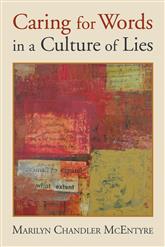Like any other life-sustaining resource, language can be depleted, polluted, contaminated, eroded, and filled with artificial stimulants. Like any other resource, it needs the protection of those who recognize its value and commit themselves to good stewardship. — Caring for Words in a Culture of Lies by Marilyn Chandler McEntrye (Grand Rapids, MI: William B. Eerdmans Publishing, 2009), 1.

A few weeks ago I shared a Celtic Christian prayer for our speech. I subsequently offered the prayer in a number of conversations and settings. Reminded of the importance of retrieving, reviving, and renewing “our precious language resources” (10), I set aside time to re-engage with the “high calling” (54) of Caring for Words in a Culture of Lies. Below are several quotes to encourage us to strategically steward the words, nourish the conversations, and tell the truth we have been given as a “little Christ.” To take another step in this “extreme sport [and lifelong process] for the very committed” (54) read Bob Trube’s review, then prayerfully consider and discuss the “stewardship strategies” advocated by Caring for Words in a Culture of Lies.
Peter’s admonition to “be sober, be watchful” applies to this enterprise [i.e., the long conversation that is the warp and woof of civil and communal life]. Noticing how things are put, noticing what is being left out or subverted, takes an active habit of mind. But what is our task as a logocentric people if not to cherish the word? God, who became, as Eliot so beautifully put it, the “word within a word, unable to speak a word,” has put a measure of God’s own power into our hands and on our tongues. May we use it to good purpose. — 21
Our lives are lived in relationship with words, written and spoken, sacred and mundane. They are manna for the journey. As embodied language we take our whole bodies with us into the act of reading, which, at its best, is spacious, full-bodied, wholehearted, and infused with the breath of life. — 86
At their best, if they are doing what they are meant to do, stories help us to cultivate compassion. This, I think, is their primary function. They open our hearts and imaginations. They invite and challenge and tease us into understanding and take us places we might not otherwise consent to go. — 126
Love is the energy that fuels the whole enterprise of wrestling with words and meanings — the longing to see the source of being and meaning “face-to-face.” Poetry brings us closer to that unsettling and reassuring encounter. Eugene Peterson claims that “to eyes that can see, every bush is a burning bush.” Poems, when they are doing what they do best, offer us a glimpse of that fire. — 169
In closing . . .
God of mercy and of grace, you know the secrets of our hearts: how blind we are to our faults, yet harsh in judging others; how swift we are to take for gain, yet slow to give for others; how proud we are of our successes, yet grudging in our praise of others. — 217. *
*See Prayers from the Reformed Tradition: In the Company of Great Cloud of Witnesses, ed. Diane Karay Tripp (Louisville, KY: Witherspoon Press, 2001), 39.
Tom enjoys daily conversations regarding living out the Biblical Story with his wife Theresa and their four girls, around the block, at Elizabethtown Brethren in Christ Church (where he teaches adult electives and co-leads a small group), among healthcare professionals as the Northeast Regional Director for the Christian Medical & Dental Associations (CMDA), and in higher ed as a volunteer with the Emerging Scholars Network (ESN). For a number of years, the Christian Medical Society / CMDA at Penn State College of Medicine was the hub of his ministry with CMDA. Note: Tom served with InterVarsity Christian Fellowship / USA for 20+ years, including 6+ years as the Associate Director of ESN. He has written for the ESN blog from its launch in August 2008. He has studied Biology (B.S.), Higher Education (M.A.), Spiritual Direction (Certificate), Spiritual Formation (M.A.R.), Ministry to Emerging Generations (D.Min.). To God be the glory!

Leave a Reply